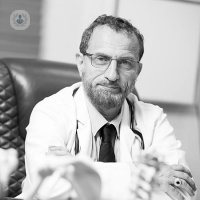New approaches in the treatment of pain: the low level laser
Written by:Musculoskeletal conditions are common in the UK, affecting millions of us across the country. According to Arthritis Research, over 30 million working days each year are lost as a result of musculoskeletal conditions, and 10 million adults across England and Scotland alone are affected by persistent back pain. There are various types of musculoskeletal conditions, including osteoarthritis, arthritis, gout, and ankylosing spondylitis. These conditions fall under the umbrella term of 'rheumatism'. Here, Dr Dhiya Houssien, international rheumatologist and expert in rheumatic diseases, explains the causes of rheumatism and his approach to treating it.
What is rheumatism?
The term “rheumatism” is used to describe a number of painful conditions that occurs in muscles, ligaments, tendons, nerves, joints, and bones. The term covers at least 200 different conditions classified as localised, such as bursitis and tendonitis, and regional, such as chest wall pain or generalised as in fibromyalgia.
Rheumatic diseases are characterised by inflammation of the musculoskeletal system, and immune system abnormalities. These diseases occur as a result of dysregulation of the immune system in the body, as it loses the ability to identify what naturally belongs and what does not - therefore attacking the body's own tissues.
What are the symptoms of rheumatic diseases?
Initially, symptoms could present as joint pain and arthritis, but if not diagnosed and treated probably, rheumatic diseases can cause severe damage to major organs such as the brain, the kidneys, and skin, which could then irreversibly lose function.
How are rheumatic diseases treated?
Medication such as nonsteroidal anti-inflammatory drugs may be used to treat inflammation or pain. In patients with musculoskeletal disorders such as fibromyalgia, medications to increase their body’s level of serotonin and norepinephrine are needed. Other treatments may include injections around the painful sides.
The side effects of standard therapy cause many patients to refuse it. In order for patients to avoid going through discomfort and further pain, I did extensive research and entered into discussions with different professional experts in order to develop a method that would help patients to feel a difference after the first session.
In my practice, I take a holistic approach in treating my patients by analysing the physical, nutritional, environmental, emotional, and social aspects of the patient's lifestyle rather than focusing on the physical illness or specific parts of the body. Therefore, I do not simply focus on treating just the symptoms, but also I look for underlying causes of the disease in order to manage them.
Dr Houssien's innovative approach to pain treatment
My approach focuses on stimulating personal responsibility to achieve balance and well-being. However, it is important to stress that in my approach, I prescribe medication and refer patients on to a surgeon whenever it is necessary.
Laser acupuncture is an integral part of the strategy I use in my clinic, which I have presented at several international conferences. The approach consists of a new method using low level laser on acupuncture points, in order to reduce the number of sessions the patient attends to just one or two, while offering significant pain reduction. The Low Level Laser (LLLT) was approved in 2002 by the FDA (in the USA) as an insignificant risk device which may be used as an injective treatment for painful conditions.



